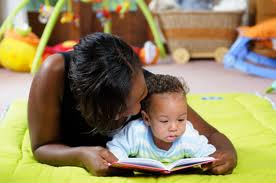Guest Post by: Maria Dowd
I spent time with my 22-month old grandson this weekend who unceasingly demonstrated his knowledge of colors, shapes, AND both lower case and upper case letters. He serenaded me all weekend with both the alphabet and phonetics songs, A through Z (his fun pronunciation of the letter “W” is an ear-sight to behold). And, he knows how to open his special early ed icon place on his mommy’s ipad and have at it. Hats off to his parents – my daughter Janelle and her husband, Vernon for their blaring commitment to Noah’s early childhood education.
The very next day, while listening to public radio, the startling findings of a Rice University: student of children through the age of 4 was released: Researchers discovered that children of affluent households hear 30,000,000 (yes, the number of zeros is correct) more words by the time they reach kindergarten, then the children of poorer families. Yes, 30 million! Additionally, the children of poorer families hear 125,000 more words of DISCOURAGEMENT, while the children of more affluent families heard 560,000 more words of PRAISE.
So, there was no shortage of love and care throughout the spectrum of families studied, the quality of COMMUNICATION was alarmingly different. The quality and quantity of conversations are markedly different. Poorer child caregivers tend to be talked AT young children, versus more affluent family who talk WITH their young children, encouraging considerably more exchanges of thoughts, feelings, observations, analytical thinking and so on.
First things first, share the article with every parent and caregiver of young children you know. Start taking immediate steps to turn this thing around by all means necessary with the young children whose life you touch. Be honest with yourself, when communicating with children do you tend to talk AT or talk with?














